Richard Stallman Manifesto: How I do my computing
- Transfer
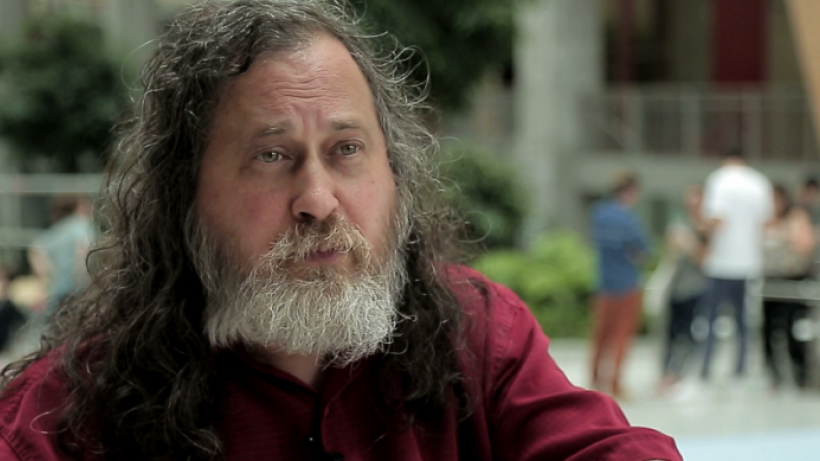
I use a Thinkpad X60 computer in which the FSF (Free Software Foundation) installed a free initialization program ( libreboot ) and a free operating system ( Trisquel GNU / Linux ). This is the first computer model with a free initialization program and a free operating system that has ever gone on sale . Therefore, this is the first computer product that FSF approved (but was not sold by Lenovo).
Before that, I used Lemote Yeeloong for several years .. At that time, it was the only laptop with a free installation program and a free operating system that could be bought. But it was never sold with a free operating system.
Before that, I used OLPC (One Laptop Per Child) for several weeks. I stopped because the OLPC project decided to support Windows, but I did not want this. OLPCs use special firmware for WiFi, so I could not use the internal WiFi device. It doesn’t matter, I used the external.
The results bother me. I expected to see millions of children using Windows with OLPC. Instead, I see millions of children using Windows with Intel Classmate.
I used to use devices completely on free GNU / Linux systems, but there were non-free BIOSes. For eight years I have been trying to find a way around this problem.
The publication is supported by Edison , which develops an online real estate database , and also designs and develops software for industrial scales and calibration equipment .
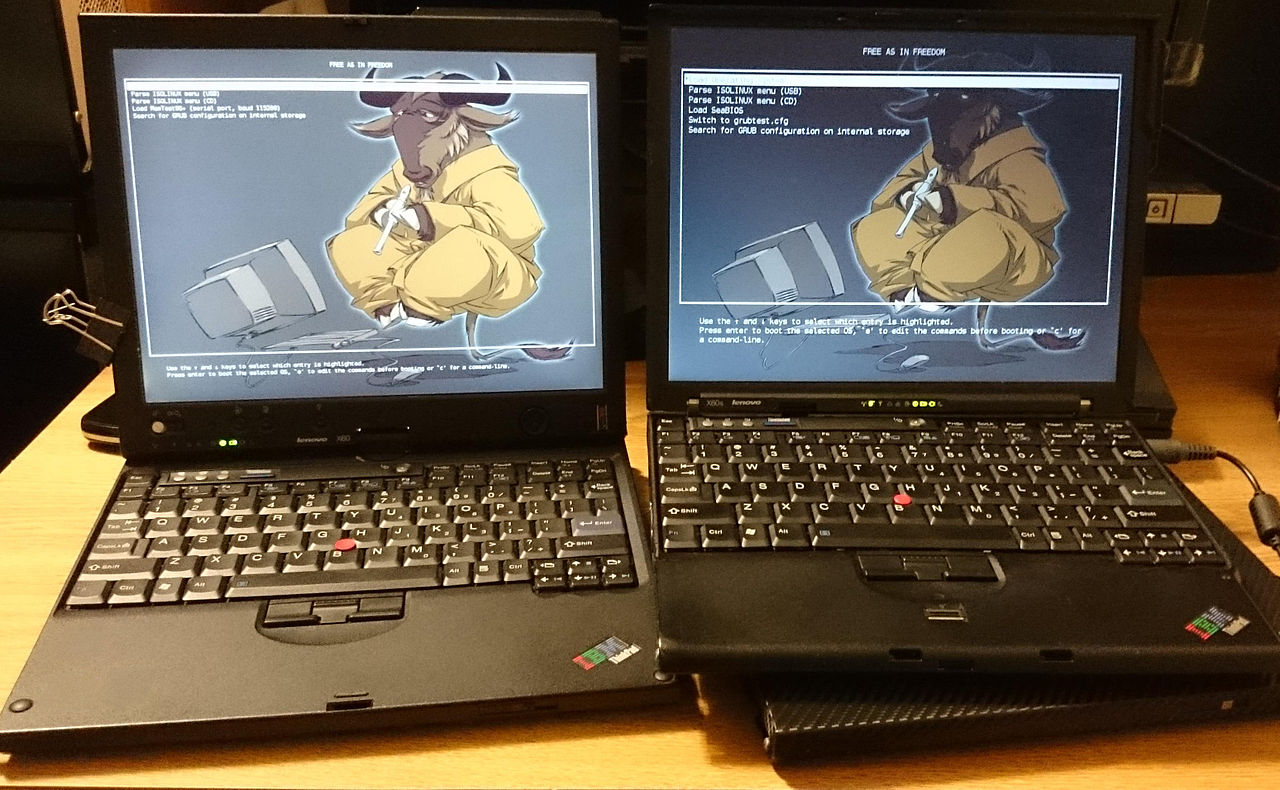
I do not have a favorite GNU / Linux distribution. I recommend ethical distributions to everyone - namely, those that run 100% free software.
I decided not to have preferences regarding ethical distributions. But I am not able to judge them by other criteria: even to try them all will require a lot of work.
I mainly use a text console, for convenience. Most of my work consists in editing text, and it is much more efficient to do this in a text console. On the text console, the touchpad cannot cause me any problems if I accidentally touch it.
I use X11 when I need a graphical interface. I have no preferences regarding the graphical environment or the window manager. Since my interest in using the graphical environment is small, I do not want to waste time comparing them.
This is not a matter of ethics, just my personal preference. At the ethical level, I think that free software should provide a free graphical user interface, so GNU launched three projects into development. The third, GNOME , was successful, so the fourth project was not needed.
Mostly I was editing in Emacs . I read and sent emacs emails using Mx rmail and Cx m. I did not have experience with other email client programs. In principle, I would be glad to know about other free email clients, but this is not a matter of primary importance and I do not have time for this.
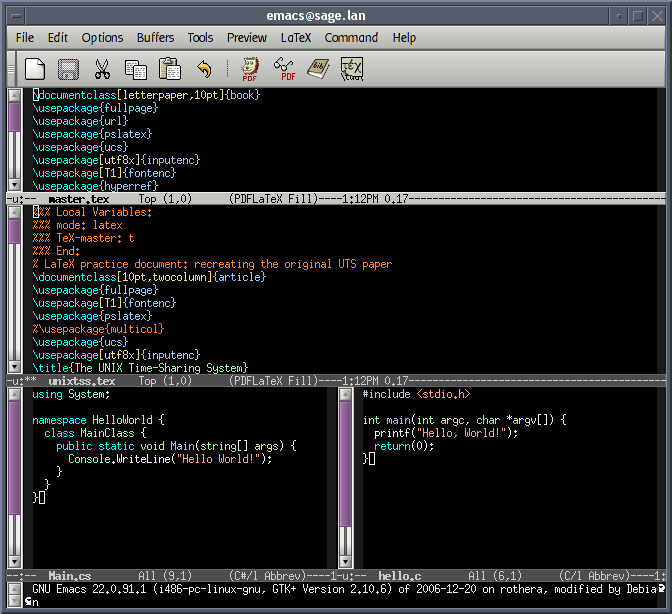
I edited pages on this site using Emacs, although volunteers helped set up political and urgent notes. I had no experience with other ways to maintain websites. In principle, I would be happy to learn about other ways, but this is not a matter of primary importance and I have other things to do.
This site is very easy to maintain. I edit the pages as if I were doing this manually in HTML. I only know the basics of HTML; those who know more make up the top and bottom of the pages and make more complex layout of the main page. Volunteers help me add political notes every day after they receive a letter from me in the mail. The job of cron is to “flip” a page with political notes every two months. Photo gallery generated using perl script. The search function on the site is carried out using this code .
Want to help with this? Write to rms on gnu.org.
This explains the design concept , and why I find the concept of “user experience” disgusting. Therefore, I want stallman.org to remain simple: it was not a “user experience”, but a place where I provide certain information, views and options for you.
I never used Unix (not a minute) after I decided to develop a free replacement for it ( GNU system ). I decided to stick with this design because it seemed portable and pretty straightforward. I have never been a fan of Unix; I criticized her too. But she is not bad overall as a model.
In the mid-90s, my hands hurt so badly that I could write most of the day with just one finger. The FSF hired people to print part of the day for me, and part of the day I was in pain. A few years later I found out that this was due to the hard keys of my keyboard. I switched to a less rigid keyboard and the main problem was gone.
My problem was not carpal tunnel syndrome: I avoid this by keeping my arms straight when I type. There are several types of pain in the hands that can be caused by repeated stress; I don’t think you have what you heard about.
Why I came up with the name POSIX .
I have been using the internet ever since it appeared. I never used UUCP, although I sometimes sent emails to addresses that included transmission through UUCP.
I am very careful about how I connect to the Internet. In particular, I refuse to connect through portals that require identification or run any proprietary non-trivial JavaScript programs . I like to work anonymously.
I often connect to the Internet in a strange house. A person, of course, knows who I am, but that does not bother me. However, I am opposed to having my identity in a database that they can find. I prevent this by changing my MAC address in every place.
I am very careful about how I use the Internet.
I usually do not connect to websites from my own machine, except for a few sites with which I have a special relationship. I get web pages from other sites by sending an email to a program (see git: //git.gnu.org/womb/hacks.git), which receives them, just like wget, and then forwards them back to me. Then I look at them in a web browser if you cannot see the HTML page directly. First I try lynx , and then a graphical browser if the page needs it (using konqueror to get information that cannot be obtained otherwise).

I periodically browse unrelated sites using IceCat via Tor. Except in those rare cases when I am not opposed to giving them my identity. I think this is enough to prevent me from connecting through my browser history. IceCat blocks tracking tags and most fingerprinting methods.
I never pay for anything on the net. I do not do anything on the Internet that requires payment. (I made an exception for fees on the stallman.org domain, since it is connected with me anyway). I also avoid credit card payments .
I don’t mind paying for a copy of an e-book or for music trackson the internet if I can do it anonymously and if it's ethical (not DRM or EULA). But this option almost never exists. I am constantly looking for ways to change this.
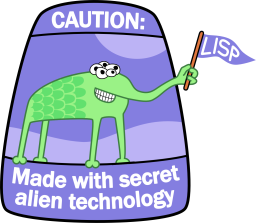
The most powerful programming language is Lisp. If you don’t know Lisp (or its variant, Scheme), you don’t know what it means when you talk about the power and elegance of a programming language. One day you will learn Lisp and understand what is missing in other programming languages.
Unlike most languages today that focus on defining specialized data types, Lisp provides several data types that are common. Instead of defining specific types, you build structures from these types. Thus, instead of suggesting a way to define a list of this type and a list of that type, Lisp has one list type that can contain any data type.
Where other programming languages allow you to define a list-of-this-type search function and sometimes a way to define a general list-search function that you can use for a list-of-this type, Lisp makes it easy to write a function that will search for any list - and provides a wide range such functions.
In addition, functions and expressions in Lisp are represented as data in such a way that it is very easy to work with them.
When you start the Lisp system, you enter the read-execute-print cycle. In many programming languages there is nothing like reading, nothing like running, and nothing like printing. What are the significant disadvantages!
Lisp is no harder to understand than other languages. So if you have never studied programming, start with Lisp. If you learn how to edit with Emacs, you can learn Lisp by writing an editing command for the Emacs editor. You can use Emacs Introduction to Programming to learn Lisp. It's free and you can order printed copies from FSF.
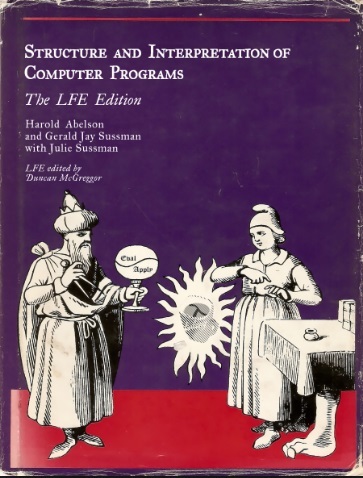
You can learn Scheme (and many in-depth programming ideas) from Abelson and Sassman 's “Structure and Interpretation of Computer Programs” . This book is now freely available, although hard copies do not think so.
Please do not buy books (or anything) on Amazon !
My favorite programming languages are Lisp and C. However, since about 1992, I have been working mainly on free software activity, which means I'm too busy to program a lot. As a result, I did not have the time or opportunity to learn new languages such as Perl, Python, PHP, or Ruby.
I read a book about Java, and found it to be a very elegant development of C. But I never used it. I once wrote code in Java, but the code itself was in C and Lisp (I was in Java at that time).
By the way, I find C ++ ugly.
I looked at the Python documentation after people told me that it looked like Lisp. My conclusion is that this is not so. `read ',` eval', and `print 'are completely absent in Python.
I firmly refuse to install proprietary software or tolerate the fact that they are installed on my computer or on computers that I need to work with.
Although if I am somewhere on a visit or on a trip where the only devices available contain proprietary software, I do not refuse to use them. I will use them for simple tasks like searching for information on the Internet. This limited use does not give my consent to the licensed software and does not make me the culprit of his presence on the computer or the owner of the copy, so I see no reason to refuse it. Of course, I explain to the locals why they should transfer their devices to free software, but I do not put pressure on them, because this is not the best way to convince them of this.
In addition, I do not need to worry about what software is in the kiosks, pay phones, or ATMs that I use. I hope that their owners will transfer them to free software for their own good, but I have no need to refuse to use them until then. I am aware that these devices and their owners can do something with my personal data, but this is another issue that arises even if they use free software.
The main thing is to minimize the types of activities that give them any information about me.
This is my policy regarding the infrequent use of the device. If I used it hourly every day, it would not be a rare use anymore - it is regular use. Then I would start to worry about my software and feel obligated to keep track of it.
In addition, if I am asked or brought in to set up a computer, this makes me ethically responsible for downloading the software. I insist on free software, as if it were my computer.
Regarding microwave ovens and other household appliances, if updating the software is not a normal part of using the device, then this is no longer a computer. In this case, I think that the user does not need to take into account which processor contains the device, what software it has, or how it is arranged. However, if he has the “firmware upgrade” option, this means that installing various software is a normal part of its use and then this is a computer.
Skype (or any proprietary and non-interoperable communication programs) is a special case because of its network effect. Using Skype to chat with someone who also uses Skype is encouraging the use of proprietary software (if you do this all the time, you force others to use proprietary software). Therefore, I will not use Skype in any circumstances (see additional information ).
Streaming multimedia dis services such as Netflix and Spotify require proprietary client programs that impose digital restrictions on mechanisms ( DRM) designed to prevent the user from saving a copy of the stream data through his own computer. You should never use DRM, which you cannot break, so you should not use these dis services if you cannot crack their DRM.
Another injustice of both streaming client programs is that they impose unfair contracts (license agreements) that restrict users more severely than copyright law itself. I do not agree with this state of affairs and I hope that you will also reject them.
These streaming dis services are malicious technologies designed to make people asocial (unless you have a copy, you cannot share copies). Fighting them is one of the top priorities.
A friend once asked me to watch a video with her participation, which she was going to show on her computer using Netflix. I refused, saying that Netflix is claiming my freedom, and I am not going to participate in this under any circumstances.
Away, damned Spotify! Down with Netflix!
I mainly use DuckDuckGo for search the last couple of years. It works with JS disabled, but you have to follow the link before you search for anything.
I also sometimes use ixquick.com and google.com. My usual precautions should not let them know me.
I don’t sit on any social networks, because I am not comfortable working in this way. This does not mean that I am against them. Some of them are pretty good. Social networks have special ethical issues that are very different from ethical issues regarding software distribution ( free vs proprietary ) and there is a rather significant difference between these issues.
I have a Twitter account called rmspostcomments, which I use to log in to other sites or post comments on other articles. I never post on Twitter. Someone created an account stallman_feed, which posted posts about my notes. Any other Twitter account under my name is created by impostors.

The rms account on gnusocial.no follows notes from this site, but I do not post them directly. This site is run by GNU Social .
In addition to these two accounts, I do not have any other accounts on social networks.
I do not post on 4chan. I have nothing against 4chan and I occasionally answer questions about him in an interview, but if you see any posts there under my name, do not believe them.
I have never had a Facebook or Google+ account. Some imposters created a Facebook account under my name. This is not my page. The Google+ account signed with my name is not mine either.
I reject Facebook because it requires each user to have only one account, which means that all human actions are combined into a single whole. They also insist that people use their real names.
I can proudly tell about myself when I express my views; I can afford to do this, as I am in a fairly safe position. There are people who rationally fear reprisals (from employers, gangsters, bullies, or the state) if they sign their name when they state their point of view. For their own sake, let's abandon any social networks that insist that you use your real identity.
Of course, Facebook is bad for many other reasons .
Google+ used to require a real person’s name, but as far as I know, he doesn’t do that anymore. However, it requires identification in the form of a telephone number.
Meanwhile, Google+ has another fatal flaw: it requires the execution of a proprietary JavaScript program if you want to send a message.
Sometimes people ask me to recommend an email service. Two ethical issues for the email service:
- Is it possible to use it without any proprietary software (including proprietary JavaScript programs from the site)?
- Does she respect your privacy?
For the first question, see the FSF page . I have no way to verify that any email service is satisfactory. So on this score I have no recommendations.
However, I can assume that it would be wise to use an email service that is not related to your search engine. Thus, you can be almost sure that the content of the email will not affect the search results. You do not have to identify yourself through your search engine in any way.
Every digitally limited management (DRM) product claims your freedom.

Therefore, you should not buy or endure any products with DRM (Digital rights management) , which binds you hand and foot. For example, do not use encrypted DVDs if you have DeCSS or another similar program. And never use BluRay discs unless you can find a way to break the shackles of DRM. Do not use Amazon Swindle or other e-book readers that claim your freedom. Do not use music or video services with DRM (if they require proprietary client programs, they probably follow users in some way).
Translation: Diana Sheremyova
